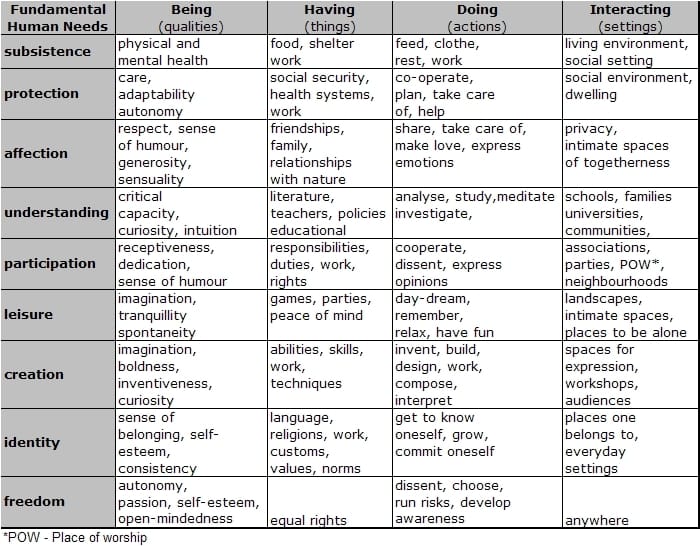Usually we think of identity in individualistic terms: “As an XYZ person” or “I am ABC”. But I’ve been thinking more along the lines of Chilean economist Manfred Max-Neef. Here’s his taxonomy of fundamental human needs (useful as a self-regulation checklist!):

Max-Neef’s idea of identity is very rich in everyday social context. Identity is linked to shared languages, religions, customs belief systems, values. It involves commitment. Central to it is the sense that you belong. And can belonging even make sense without something or somewhere or someone(s) else to belong to?
This social/relational idea of identity resolves a few major question in my recent history: Why am I still hurting from my job being made redundant in 2019? Why hasn’t anything I tried since then stuck? And finally, why do I grieve over the job I lost this year when I didn’t even want it in the first place?
~
To go back a little further, I didn’t feel any sense of belonging while I was growing up. I was largely ignored both at home and in school. And as my schoolmates moved through life as a mostly contented flock, with their petty squabbles and crushes, I was just this fat, pimply, Kurt Cobain-worshipping outsider looking in.
It was only after I started working that I felt something like social acceptance. For the first time, my interests weren’t extra-curricular peculiarities that befuddled teachers — they were skills that were actually valuable. And my personality wasn’t a problem for disciplinarians to iron out — I actually got along with other eccentrics at work. I couldn’t believe my luck! I had found “my people”!
I felt this sense of belonging at almost every workplace I’d been in from 2013 to 2019. Over time this solidified into an identity: I was a writer and editor, and I was undoubtedly good at it. People at work seemed to like me. It was a happy ending for the misfit…
…and then came the layoff.
Imagine: complete destruction of the only sense of belonging I’ve ever had in my life! Yet I couldn’t be upset, because It’s Just A Job. I should have been more cynical — I shouldn’t have let myself believe that I had truly found acceptance and belonging.
From 2020 to 2024 I tried all kinds of work, desperately to find something new to belong to. I thought there would be communities or workplaces waiting to welcome me with open arms. It turns out that, outside of religious cults, instant acceptance is rare. You need to commit your time and energy; you only reap what you sow.
I did the usual career coaching and counselling stuff. It did not help. The scripts were about financial security, mostly. Maybe a side of career satisfaction, if you’re lucky. Now I know why they were so unsatisfying. It’s because I sought something deeper: I was longing for belonging.
~
OK, so how do I move on?
To start with, let’s acknowledge that while identity/belonging is a genuine need, it cannot be easily met through the capitalist system — especially not a job market that dehumanises people.
Of course, employers may try to cultivate a sense of belonging (“welcome to the Acme Corporation family”), the better to appropriate employees’ labour. (Marx points out that only the capacity to work can be bought for a wage; actual labour must can only be freely given by the worker.)
Another strategy I tried was to look for belonging in non-profit organisations, associations and interest groups. These things can be fun, meaningful, socially stimulating — but I don’t want to simply assimilate into an existing community and “wear” a ready-made identity.
My way forward is to assume there is no possibility of the undiluted belonging I once felt. There just isn’t any mythical workplace or organisation or community waiting for me to join the ranks. Now that sounds pessimistic, but hear me out. It’s only when I stop looking for something out there that I can focus on what and who I have right now.
Start small, you know? Instead of trying to find some organisation with the same grand ideals, I can cultivate a sense of belonging by deepening existing relationships with people I already admire and connect with. Instead of trying to find and plug myself into an entirely new career, I can cultivate identity by consistently doing small bits of work or study that interest me. Etc.
Maybe I won’t ever feel the “I’m a writer and I hang out with other writers 8 hours a day! Life is awesome!” great heights of 2017. And that’s okay. I don’t know what my identity is, exactly, but it has obviously evolved in the past 8 years. That can only be a good thing.
